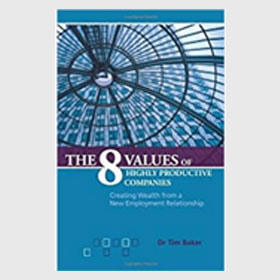Organisation
Five Conversations Framework
The Five Conversations Framework is effectively a replacement for the traditional performance review system. It consists of five, ten minute conversations between managers and their staff over six months. These conversations are:
- Climate Review conversation
- Strengths and Talents conversation
- Opportunities for Growth conversation
- Learning and Development conversation
- Innovation and Continuous Improvement conversation
![Slide1[1]](https://www.winnersatwork.com.au/wp-content/uploads/2016/01/Slide11.jpg)
The above diagram illustrates the eight steps in implementing the Five Conversations Framework into an organisation.
Populate template
We provide you with an easy to fill out template to record the names and contact details of members of the organisation and who they report to.
Assess current state
We use a 360-degree feedback tool to assess the state of the current performance management system in the organisation. This provides a benchmark for assessing the effectiveness of the Five Conversations Framework.
Management training
All managers and anyone who is required to manage performance undertakes a three hour training programme on howw to apply the Five Conversations Framework.
Utilise support system
All conversations are recorded in an electronic database. Participants are issued with a unique key to protect confidentialities
Five conversations
All organisational members over the next five months undertake the five conversations.
Performance increases
Positive, productive changes in performance take place as a result of the Five Conversations Framework.
Five conversations
A second cycle of the Five Conversations Framework takes place.
Re-assess changing state
We re-assess the workplace again to measure the effectiveness of the Five Conversations Framework.
“I have found all of the sessions both individual and group to be beneficial, interesting and though provoking. While some topics are always going to be of more interest to some than others especially with such a large groups there will always be something that you can take away from the session that you might use if not straight away but sometime in the future”.
How does the Corporate Culture Change Cycle (4C) benefit you and your organisation?
- The 4C uses a bottom up approach to change unlike most change approaches that uses a traditional top down approach which means that it generates more ‘buy-in’ from staff so that you can feel a sense of assurance that it will lead to sustainable behaviour change.
- Unlike most change processes, the 4C is based on changing people’s thinking rather than their behaviour which means that it is likely to lead to permanent behaviour change so that you can feel you are getting value for money.
- The 4C is a totally unique change process which means that your competitors will not be exposed to the same approach so that you can feel confident that you are a step ahead of your competitors.
- The 4C approach benchmarks your organisations culture change progress towards the development of a new employment relationship which means that you can monitor your progress in a meaningful way so that you can feel a sense of assurance about moving in the right direction towards developing a productive workplace culture.
- The 4C has an impressive track record with clients which means that it is tried and proven so that you can feel confident about its implementation in your organisation.
Why build a productive workplace culture based on creating a new employment relationship?
- Retaining good employees which mean that it reduces your overheads in recruitment, selection and training and corporate memory.
- Recruiting good employees which mean that it builds your human capital that provides you with a distinct competitive advantage.
- A more flexible, commitment, customer-focused and engaged workforce which means that you are likely to improve your bottom line.
- Better customer responsiveness which means increased repeat business.
Change Management
We are different from most organisations when we deal with change in organisations. Most approaches are obsessed with strategy and processes. Although these are important, we elieve the the most critical issue is dealing with the emotional stages of change.
Our work is based on Scott and Jaffe’s change model. Our approach acknowledges that there are four emotional states that are predictable in any change – denial, resistance, exploration and commitment. By managing these emotional states in your people effectively, you will most likely deal with this effectively. Our processes focus often the people dimension of change, since we know that this is the area that is often neglected, or done very poorly
![image002[1]](https://www.winnersatwork.com.au/wp-content/uploads/2016/01/image0021.gif)
Leadership Development
We design and facilitate a wide variety of leadership development programmes. Our point of difference is that we are in the business of changing people’s thinking first and behaviour second. by changing people’s thinking, we can sustainably change people’s behaviour. We are strong advocat for adaptive leadership practices which are in keeping with the times of accelerated change and uncertainty. We don’t do off the shelf programmes. Our programmes are specifically designed to met the needs and interests of the managers we are working with.


